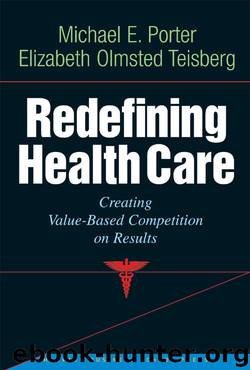Redefining Health Care by Michael Porter Elizabeth Olmsted Teisberg & Elizabeth Olmsted Teisberg

Author:Michael Porter, Elizabeth Olmsted Teisberg & Elizabeth Olmsted Teisberg [PORTER, MICHAEL E.]
Language: eng
Format: epub
ISBN: 9781591397786
Publisher: Harvard Business School Publishing Corp (Perseus)
Published: 2006-04-24T04:00:00+00:00
Restructure the Health Plan–Provider Relationship
Competing on value and playing new supporting roles with patients will require that health plans develop very different relationships with physicians and provider organizations. Some physicians would describe their interactions with health plans today as “war.”35 This adversarial mind-set needs to disappear, and some health plans are already taking steps to eradicate it. In its place should arise a spirit of collaboration regarding value creation for patients. When health plans and providers work together around value and health results, efficiency will improve exponentially and administrative costs will fall.
Physician support is critical to health plan success because most patients will (and should) make medical decisions and behavioral choices with the advice of their doctor. If the health plan and the doctor offer information and advice that conflict, patients will usually trust the doctor. Conversely, if the health plan and the doctor are in sync, the ability to make good decisions and secure appropriate patient behavior is amplified.
Restructuring the relationship between health plans and providers involves two areas: changing the nature and type of information sharing, and shifting the incentives built into patient flows and reimbursement.
Shift the Nature of Information Sharing with Providers. Health plan executives often express frustration that what they know is not listened to and utilized by physicians. Given the history, this is no surprise. There has not been a collaborative relationship centered on patient value.
Health plans need to recognize that doctors are and will always be important, if not the most important, contributors to patient choices. The health plan can assist patients and their doctors to gather information, understand their treatment options, seek the best provider to address their circumstances, ensure that the providers involved in care have up-to-date patient information, and assist in navigating handoffs in the care cycle. For example, U.R.N. has found that before it becomes involved, many patients have already been given a referral to a transplant surgeon. The information U.R.N. brings to bear can suggest that the referral is a questionable one given the outcome evidence. U.R.N. will contact the referring physician and explain that while U.R.N. cannot know everything, its data points to a different choice. It asks the referring physician to help U.R.N. learn about the suggested specialist, and ensures that the referring physician is aware of the patient’s range of covered choices. In most cases, the referring physician is surprised to learn that the patient has access to the best care, and would prefer to have the patient treated at one of U.R.N.’s identified centers of excellence. The physician can then talk with the patient about the wider set of choices.
Health plans can also support doctors with many other kinds of information that is difficult or impractical for physicians or even any one provider organization to assemble. Prescription claims, for example, can offer opportunities to uncover and share information about compliance. One health plan manager described a case in which a member with diabetes was experiencing ongoing problems keeping sugar levels under control. The health plan’s
Download
This site does not store any files on its server. We only index and link to content provided by other sites. Please contact the content providers to delete copyright contents if any and email us, we'll remove relevant links or contents immediately.
| Administration & Medicine Economics | Allied Health Professions |
| Basic Sciences | Dentistry |
| History | Medical Informatics |
| Medicine | Nursing |
| Pharmacology | Psychology |
| Research | Veterinary Medicine |
Good by S. Walden(3548)
The Social Psychology of Inequality by Unknown(3019)
The Checklist Manifesto by Atul Gawande(2848)
0041152001443424520 .pdf by Unknown(2843)
Get What's Yours for Medicare: Maximize Your Coverage, Minimize Your Costs by Philip Moeller(2643)
The Meaning of the Library by unknow(2565)
Guns, Germs and Steel by Diamond Jared(2366)
Borders by unknow(2304)
23:27 by H. L. Roberts(2248)
And the Band Played On by Randy Shilts(2199)
Being Mortal: Medicine and What Matters in the End by Atul Gawande(2122)
A Leg to Stand On by Oliver Sacks(2033)
The Hot Zone by Richard Preston(2013)
More Than Words (Sweet Lady Kisses) by Helen West(1860)
The Valachi Papers by Peter Maas(1847)
The Laws of Medicine by Siddhartha Mukherjee(1798)
The Andromeda Strain by Michael Crichton(1742)
Get What's Yours for Medicare by Philip Moeller(1690)
The Obesity Epidemic by Robyn Toomath(1673)
